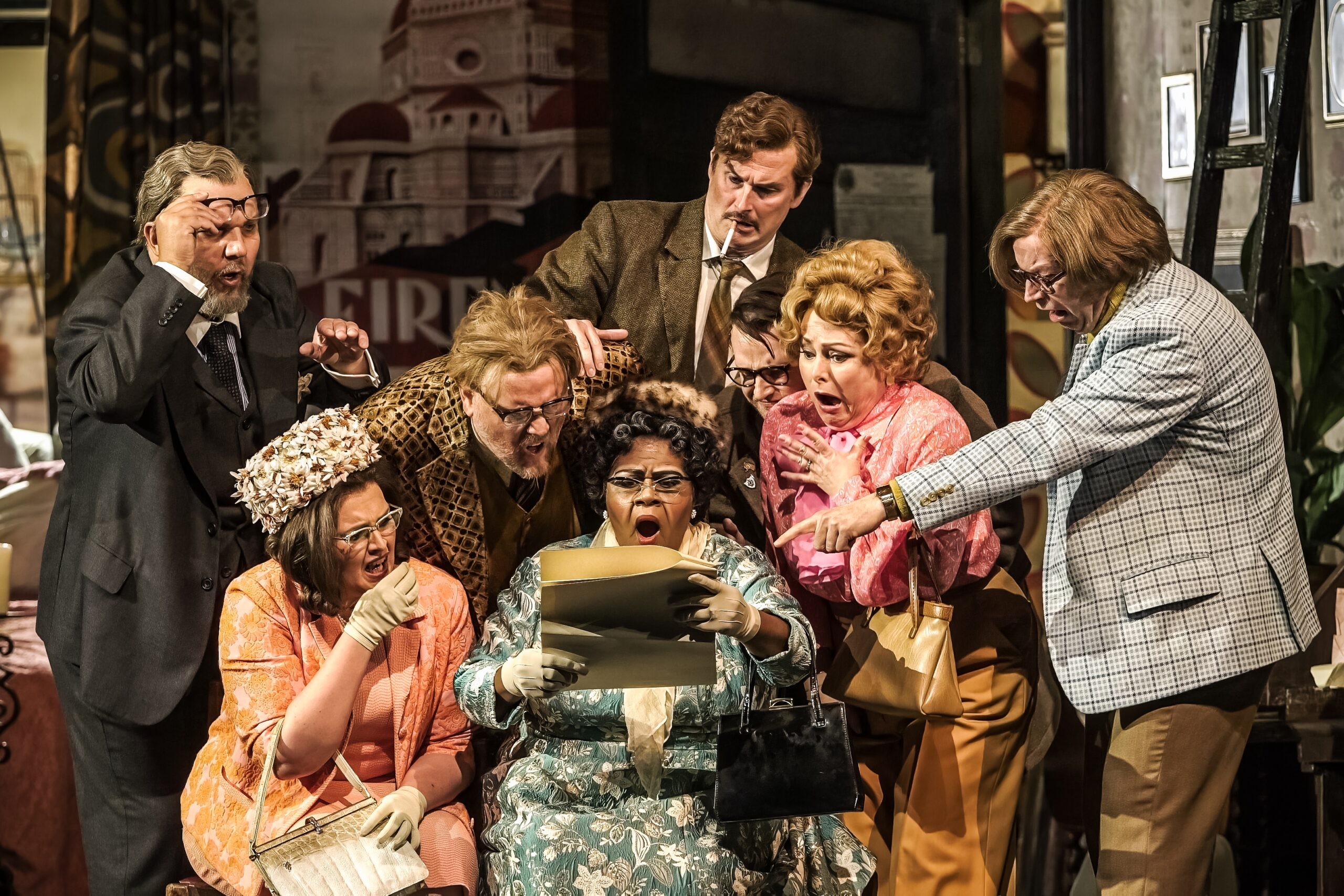
Cast of WNO's Gianni Schicchi by Puccini, summer 2024
Photo: Craig Fuller
WNO musicians vote ‘overwhelmingly’ for strike action
Welsh National Opera says it is committed to finding a solution for orchestra members that recognises the 'reality' of its financial situation following significant cuts to its public funding.
Musicians' Union (MU) members at Welsh National Opera (WNO) have voted in favour of a full strike to protest management plans to make the orchestra part-time on 85% of their current hours, reducing their pay by 15%.
In the ballot that closed on 17 July, 81.3% of voters were in favour of full strike action, with 96.9% in favour of action short of a strike, based on a turnout of 88.9%. The MU said any action won't be announced until September, before the start of the new season.
Affected MU members are campaigning to keep WNO as a full-time company, halt the proposed 15% pay cut and secure a funding package that would protect its ability to tour, as cost-saving measures have forced it to cease performances in Liverpool and reduce dates in Bristol and Llandudno.
READ MORE:
- Welsh Government earmarks £3.2m for museum repairs
- WNO members to vote on strike action over orchestra cuts
WNO said it respected the decision of the ballot but was disappointed about the potential impact on audiences.
"We have continued to engage in open and transparent negotiations with unions and are committed to finding a solution that works for our orchestra members while also recognising the reality of WNO’s financial situation following significant cuts to our public funding” a WNO spokesperson said.
WNO proposed the changes to orchestra contracts as a cost-saving measure after its funding from Arts Council England (ACE) was reduced by 35%, from £6.24m to £4m a year for the 2023-26 period. ACE subsequently granted WNO an additional £3.25m through its Transform programme to help it adapt to lower funding levels.
The company also receives £4.1m a year from Arts Council Wales but has said this figure represents an 11.8% cut against its application for standstill funding for 2024/25.
“We always want to avoid full strike action if possible, and WNO management needs to work with us to consider alternative proposals and pursue an appropriate funding solution that will enable WNO to remain a full-time company,” said Naomi Pohl, MU General Secretary.
“These cuts could be averted with increased support from Welsh Government, Arts Council Wales, Arts Council England or a combination of the three.”
A national institution
Andy Warnock, MU Regional Organiser for Wales and South West England, criticised the Welsh government for not meeting with the union ahead of the ballot.
He called for an intervention similar to that announced for Welsh museums and archives last week, following a public outcry over the deterioration of the National Museum Wales in Cardiff and warnings that it could be forced to close.
“We’re extremely disappointed that we haven’t been able to meet the Welsh Government Cabinet Secretary for Culture or the UK Government Secretary of State for Culture, Media, and Sport to discuss the situation at WNO,” said Warnock.
“The proposed cuts at WNO are going to harm a national institution through a reduction in secure jobs, artistic quality, and performances that are just as real and specific as rain dripping onto paintings. In the same way that the Welsh Government found £3.7m to support the National Museum, National Library, and other museums and archives, we call on the Welsh Government to recognise WNO's national significance.”
In its budget for 2024/25, the Welsh government made sweeping cuts to arts and cultural organisations, including a 10.5% cut for ACW, that reprioritised £16m of funding away from culture, sport, and tourism after ministers said they had been forced to make “difficult decisions” in response to reductions in its overall budget from Whitehall.
A Welsh government spokesperson told Arts Professional that employment and issues around remuneration at WNO are "a matter for the organisation" but that they are "continuing discourse" with sectors affected by budget cuts, including culture, arts, and sports.
"We have been clear our budget is up to £700m less in real terms than when it was set in 2021, and we have had to take extremely difficult decisions to focus funding on core public services," the spokesperson said.
Financial pressures for orchestras
WNO is the latest performing arts company to cut orchestral contracts due to financial pressures. Northern Ballet announced last year that it would switch to recorded music for some performances after receiving standstill funding from ACE for 2023-2026.
Meanwhile, in February, industrial action at the English National Opera over cost-saving measures to downsize and cut hours of its orchestra and chorus was narrowly avoided after last-minute talks with the company.
Join the Discussion
You must be logged in to post a comment.